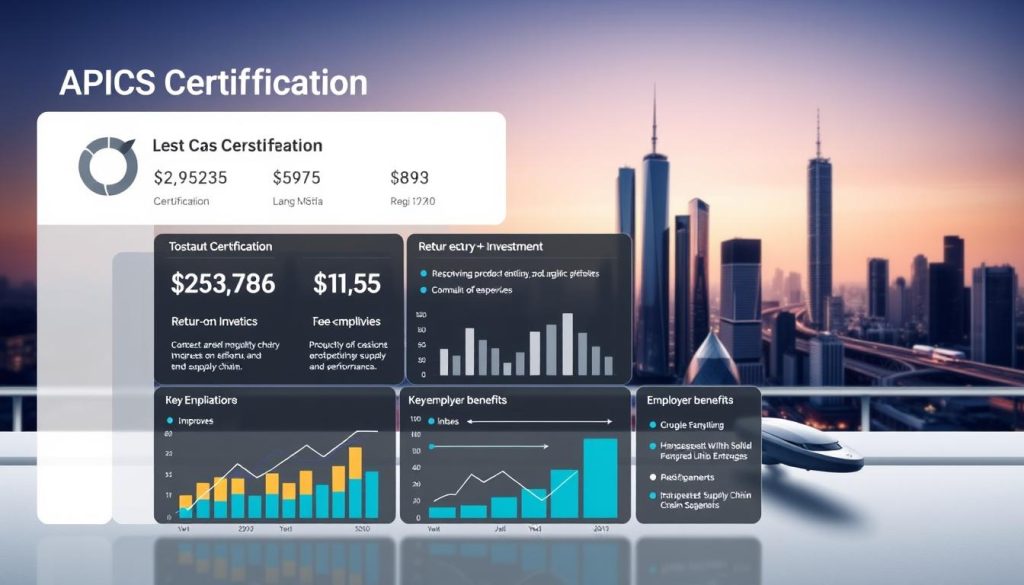Unlock Your Supply Chain Expertise with APICS Certification
The Association for Supply Chain Management (ASCM), home of APICS, is the global standard for supply chain, logistics, and operations management. Its apics certification programs—CPIM, CSCP, CLTD, and SCOR-P—enhance planning, inventory control, and end-to-end strategy. They also improve logistics and performance using the SCOR model.
In the United States, business leaders leverage apics supply chain certification to boost forecasting accuracy, reduce cycle times, and enhance service levels. These credentials align training with measurable outcomes, fostering better decision-making and resilient operations.
Supported by ASCM research and best practices, each certification builds technical and practical skills. Professionals gain tools to analyze risk, streamline flows, and enhance on-time delivery. They also meet sustainability and cost targets.
For managers aiming for a supply chain management certification with proven impact, APICS provides a structured path. It offers clear learning objectives and standardized exams, signaling expertise for hiring and promotion.
Whether it’s advancing a plant, a distribution network, or a global program, apics certification programs connect learners to a global community. This connection is through ASCM chapters and online forums. The outcome is continuous development, stronger decisions, and higher performance at scale.
What Is APICS and ASCM? Understanding the Gold Standard in Supply Chain Credentials
APICS, now part of the Association for Supply Chain Management (ASCM), sets a high standard for professional skills. Its certification programs meet employer needs in planning, sourcing, making, delivering, and returning. For professionals in the United States, an APICS certification shows they have the skills needed for evidence-based decision-making.
ASCM oversees these standards. It does this through research, structured curricula, and verified assessments. This elevates the value of supply chain management certifications. The credentials align with today’s operating models, helping teams standardize processes and improve service levels.
APICS within ASCM: A globally recognized leader in supply chain and operations
As ASCM’s learning and credentialing arm, APICS offers a portfolio recognized by manufacturers, retailers, and logistics providers. Programs like CPIM, CSCP, CLTD, and SCOR-P validate essential skills used by companies like Amazon, Procter & Gamble, and Boeing. This framework supports consistent skills development and scalable operations.
Professionals use APICS certification programs to show they have practical knowledge in materials management, demand planning, and distribution. An APICS certification verifies their readiness to apply standard metrics in their daily work.
How ASCM advances innovation, operational excellence, and sustainability
ASCM boosts sector performance with research-backed content, model-based improvement, and competency standards. Its guidance supports lean flow, advanced planning, and resilient networks, aligning with ESG priorities in U.S. supply chains. Organizations use these principles to reduce waste, improve lead times, and maintain service quality during volatility.
By linking a supply chain management certification with real-world case studies and benchmarks, ASCM ensures training leads to measurable results. Teams gain tools for scenario analysis, risk control, and continuous improvement, leading to better throughput and on-time performance.
The value of a strong professional network for continuous learning
ASCM’s global community connects practitioners across procurement, operations, and logistics. Members get access to research, benchmarking data, and peer forums that reinforce skills gained through APICS certification programs. This network supports ongoing learning and practical problem-solving.
For career mobility, an APICS certification, combined with active community engagement, boosts credibility. Regular exposure to best practices and live case exchanges helps professionals stay up-to-date as technologies and regulations evolve.
| Credential Focus | Primary Capabilities | Business Outcomes | Who Benefits |
|---|---|---|---|
| CPIM | Demand planning, MRP, inventory accuracy | Lower stockouts, improved turns, stable schedules | Planners, schedulers, plant operations |
| CSCP | End-to-end strategy, supplier integration, analytics | Better cash-to-cash, reduced total landed cost | Supply chain leaders, analysts, consultants |
| CLTD | Transportation, warehousing, last-mile execution | Faster cycle times, higher fill rates | Logistics managers, 3PL coordinators |
| SCOR-P | Process mapping, metrics, performance improvement | Standardized KPIs, reliable cross-functional alignment | Operational excellence and PMO teams |
Why Choose a Supply Chain Management Certification for Career Growth
A supply chain management certification proves your expertise in planning, execution, and performance improvement. It shows you can make better forecasts, schedule accurately, and control inventory tightly. APICS CPIM and CSCP certifications are valued for their role in analytical decision-making and aligning functions. They support end-to-end integration and logistics efficiency.
The 2022 ASCM Supply Chain Salary and Career Report highlights the benefits of certification. It shows that those with at least one certification earn 17% more on average. This makes a supply chain professional certification a smart investment in your earning power and credibility.
For managers and analysts, certification opens doors to new roles in planning, sourcing, logistics, and performance optimization. Preparing for the APICS certification exam enhances your skills in demand planning, materials management, and resilience planning. This enables you to make stronger service level commitments and risk-aware decisions under real constraints.
U.S. employers look for candidates with both practical experience and recognized credentials. A supply chain management certification showcases your mastery of proven methods, consistent terminology, and data-driven practices. It improves coordination across sales, operations, and supplier networks.
Those preparing for the APICS certification exam gain a structured approach to process improvement and measurable KPIs. Combining CPIM or CSCP with on-the-job projects can accelerate improvements in cost-to-serve, inventory turns, and on-time performance. It also builds trust with stakeholders.
APICS Supply Chain Certification
The apics supply chain certification is a benchmark for operational proficiency. It aligns core skills with business outcomes. This makes it a practical certification for planners, analysts, managers, and executives across U.S. industries.
How APICS credentials boost credibility and decision-making
APICS credentials validate capabilities that shape daily decisions. They cover demand planning accuracy, inventory optimization, logistics execution, and performance improvement. Standardized frameworks and shared terminology help teams apply evidence-based methods.
This improves forecast reliability and service levels. Because the apics certification exam measures applied knowledge, certified professionals demonstrate consistent decisions. They handle real constraints like lead times, capacity limits, and cost-to-serve.
This strengthens cross-functional trust and raises governance standards in S&OP and fulfillment.
Recognized pathways for professionals and organizations in the United States
U.S. employers value distinct APICS pathways for role alignment. CPIM is for planning and inventory, CSCP for end-to-end integration, CLTD for logistics and distribution, and SCOR-P for performance using the SCOR model. Each pathway supports scalable practices across manufacturing, distribution, and services.
Organizations deploy these credentials to standardize processes. They reduce variance in decisions and embed continuous improvement. For individuals, the certification track provides a structured route from foundational knowledge to advanced leadership skills.
Salary and advancement: What the data suggests
ASCM reporting shows a measurable pay advantage. The 2022 ASCM Supply Chain Salary and Career Report cites a 17% earnings premium for professionals with at least one certification, certificate, or credential. This reflects market demand for validated expertise.
When budgeting, candidates weigh the apics certification cost against expected gains in compensation and role mobility. Employers often support fees for the apics certification exam. They see the credential as a sign of faster ramp-up, higher productivity, and stronger KPI attainment.
| Pathway | Primary Focus | Key Decision Areas | Typical U.S. Roles | Business Impact |
|---|---|---|---|---|
| CPIM | Planning and inventory | Forecasting, MRP, capacity, inventory policy | Planner, supply analyst, production scheduler | Lower stockouts, leaner inventory, stable schedules |
| CSCP | End-to-end integration | Network design, supplier collaboration, demand-supply alignment | Supply chain manager, procurement lead, S&OP manager | Better service levels, reduced total cost, improved visibility |
| CLTD | Logistics and distribution | Transportation modes, warehousing, last-mile performance | Logistics manager, distribution supervisor, transportation analyst | Faster throughput, lower freight spend, higher OTIF |
| SCOR-P | SCOR-based performance | Plan-Source-Make-Deliver-Return-Enable metrics and governance | Operations leader, continuous improvement head, PMO | Standardized metrics, cross-team alignment, measurable ROI |
Professionals use the apics supply chain certification to signal readiness for larger mandates. Teams rely on it to embed common language, disciplined analysis, and repeatable results. Balanced against the apics certification cost, the long-term value lies in verified capability and stronger career trajectories.
APICS Certification Programs Overview: CPIM, CSCP, CLTD, and SCOR-P
APICS certification programs, developed by ASCM, align with today’s supply chain standards and operational needs. Each path has a unique role, building measurable skills for those seeking supply chain professional certification in the United States.
These tracks cover planning, integrated process control, logistics execution, and performance management. Candidates choose the credential that matches their role, data responsibility, and improvement goals.
APICS CPIM certification: Planning, inventory, and operations excellence
The apics cpim certification enhances skills in demand planning, MRP, and detailed scheduling. It improves inventory accuracy, safety stock policy, and cycle counting. This reduces shortages and surplus.
It also sharpens BOM management, capacity planning, and shop-floor control. This stabilizes lead times and boosts service levels. It’s ideal for operations analysts or planners seeking supply chain professional certification.
APICS CSCP certification: End-to-end supply chain strategy and integration
The apics cscp certification covers the entire supply chain flow from planning to returns. It focuses on cross-functional alignment and partner integration, using standards like those of Procter & Gamble and Amazon.
It helps structure network strategy, supplier collaboration, and data governance. This raises availability and margin. It’s perfect for professionals managing multi-enterprise processes within apics certification programs.
CLTD: Logistics, transportation, and distribution mastery
CLTD focuses on freight optimization, modal selection, and warehouse design. It enhances carrier management, slotting, and last-mile performance while managing costs and emissions.
It covers network modeling, parcel and LTL strategies, yard operations, and reverse logistics. CLTD is for distribution leaders needing supply chain professional certification focused on execution.
SCOR-P: Performance improvement using the SCOR model
SCOR-P teaches teams to apply the SCOR model across various stages. It standardizes process definitions and metrics for benchmarking and closing performance gaps.
Participants design initiatives tied to reliability, responsiveness, agility, cost, and asset metrics. SCOR-P complements apics certification programs by linking strategy to measurable outcomes.
| Credential | Primary Focus | Key Competencies | Ideal Roles | Typical Outcomes |
|---|---|---|---|---|
| APICS CPIM | Planning and inventory control | MRP, capacity planning, scheduling, stock policy | Planners, schedulers, operations analysts | Lower shortages and excess, stable lead times |
| APICS CSCP | End-to-end strategy and integration | Network design, S&OP, supplier collaboration, returns | Supply chain managers, integrators, program leads | Aligned functions and partners, higher service and margin |
| CLTD | Logistics, transportation, distribution | Freight management, modal choice, warehousing, last mile | Logistics managers, distribution leads, 3PL coordinators | Improved delivery performance and cost structure |
| SCOR-P | SCOR-based performance improvement | Process standardization, KPI design, benchmarking | Process owners, continuous improvement leaders | Targeted gains in reliability, agility, cost, and assets |
Professionals often begin with apics cpim certification for operational depth or pursue apics cscp certification for enterprise scope. Together, these apics certification programs provide a clear path to supply chain professional certification, aligned with current best practices.
How to Prepare for the APICS Certification Exam
Effective preparation for the apics certification exam begins with a well-planned strategy. Establish a weekly study routine that covers essential frameworks, definitions, and practical applications. Utilize official ASCM materials to ensure your knowledge aligns with the latest industry standards for apics supply chain certification.
Choose a study format that suits your schedule. Self-paced modules offer flexibility, while instructor-led courses provide structure and expert guidance. Blended models combine both, making them ideal for those using supply chain certification online resources.
Engage with ASCM communities for peer learning and case analysis. Participating in discussion threads and study groups helps transform theory into practical application. This collaborative approach enhances recall and accelerates your path to exam readiness.
Adopt a realistic time frame for your studies. ASCM’s Supply Chain Resilience Certificate, for example, spans 20 hours over five weeks. Use this as a model to organize your content reviews, question banks, and mock exams for the apics certification exam.
Employ active learning techniques. Engage in end-to-end process mapping, practice bill-of-materials problems, and simulate demand planning scenarios. Applying terms in real-world contexts solidifies your understanding of apics supply chain certification concepts.
Regularly assess your progress with weekly diagnostics. Identify and focus on weak areas, adjusting your study plan as needed. Consider adding supply chain certification online modules to reinforce complex topics such as network design or inventory policy.
- Define scope: list domains, objectives, and key metrics to master.
- Structure time: block study windows and recovery periods.
- Practice: rotate quizzes, flashcards, and scenario drills.
- Review: close gaps with targeted readings and problem sets.
- Rehearse: take timed mocks that reflect apics certification exam conditions.
| Study Component | Purpose | Recommended Frequency | Practical Example |
|---|---|---|---|
| Core Reading (ASCM Guides) | Build foundational knowledge for apics supply chain certification | 3 sessions per week | Review MRP logic, safety stock methods, and service-level targets |
| Problem Sets | Strengthen calculation speed and accuracy | 2 sessions per week | Compute reorder points, takt time, and capacity buffers |
| Scenario Work | Apply concepts to operations and network decisions | 1 session per week | Evaluate postponement vs. customization trade-offs |
| Peer Study (ASCM Communities) | Validate reasoning and share best practices | Weekly | Debrief case studies on S&OP alignment and governance |
| Mock Exams | Replicate apics certification exam timing and pressure | Biweekly, then weekly pre-exam | Full-length tests with item review and error tagging |
| Online Modules | Flexible refresh via supply chain certification online resources | As needed for weak topics | Short videos on forecast bias, demand sensing, and KPIs |
Supply Chain Certification Online Options and Flexible Learning Pathways
Professionals aiming for apics supply chain certification can find flexible formats that accommodate their busy schedules. An online pathway for supply chain certification offers access to apics certification programs. It ensures consistent content, verified instructors, and standardized assessments across the United States.
Self-paced, instructor-led, and blended learning formats
Self-paced courses allow learners to set their own pace, ideal for those with irregular schedules or who travel frequently. Instructor-led cohorts provide real-time guidance, structured milestones, and opportunities for peer discussion. Blended models strike a balance between autonomy and expert facilitation, ensuring both flexibility and accountability for apics supply chain certification.
Leveraging ASCM research, best practices, and communities
ASCM offers research, case studies, and best practices that align with apics certification programs. Learners can engage with communities for peer review, exam strategies, and post-exam application. This ecosystem enhances the value of a supply chain certification online by linking study content to current industry standards.
Time investment considerations for working professionals
Working managers benefit from predictable study schedules. ASCM’s resilience certificate model, for example, is 20 hours spread over five weeks, with two-hour sessions. This model shows how to efficiently schedule study time that aligns with apics certification programs. Training partners offer frequent online cohorts, allowing nationwide participation without the need for travel. This ensures learners stay exam-ready for apics supply chain certification.
Partnering with an ASCM Premier Elite APICS Training Partner
Organizations aiming for performance improvement find value in an ASCM Premier Elite APICS Training Partner. Supply Chain Mavens aligns apics certification programs with business objectives. This ensures learning outcomes align with metrics like forecast accuracy and inventory turns. Teams benefit from practical skills through certification pathways and online options, accommodating busy schedules.
Why Supply Chain Mavens for customized training solutions
Supply Chain Mavens crafts curricula based on a thorough needs analysis. They map role requirements to competency frameworks. This ensures content relevance for planners, analysts, sales, and finance teams, facilitating skill development for leaders.
Delivery strategies include diagnostics, case-based exercises, and scenario labs. For U.S.-based teams, online formats enable swift implementation without travel. Assessments confirm knowledge retention and application.
Targeted programs like Supply Chain Fundamentals for Sales Teams
Supply Chain Fundamentals for Sales Teams prepares account executives and sales engineers. It enhances their ability to price, promise, and coordinate with operations. The program clarifies lead times, capacity constraints, and inventory policies, boosting quote accuracy and margin protection.
Participants learn to frame customer commitments using demand planning logic. They understand service-level trade-offs and logistics impacts. This tightens handoffs from pitch to delivery, aligning with apics certification programs and serving as a bridge to future certifications.
Global instructor network and online class availability
Supply Chain Mavens boasts over 25 experienced instructors across North America, Europe, and Asia. They schedule cohorts to match regional time zones. The team delivers dozens of virtual cohorts annually, providing online certification to distributed teams.
Instructors come from companies like Amazon, Intel, and Maersk, ensuring examples reflect real-world constraints. Cohorts can contribute to apics certification programs while meeting internal upskilling goals for recognized supply chain management certifications.
Building Resilience: ASCM Certificates That Strengthen Your Supply Chain
Resilient operations safeguard revenue, service levels, and brand reputation. The ASCM certificate pathway offers a structured approach for teams aiming for a supply chain professional certification. It enhances a broader supply chain management certification strategy with focused competencies.
Supply Chain Resilience Certificate: Audience and outcomes
This certificate is designed for both early-career analysts and seasoned leaders. It equips them with a shared resilience strategy. It also aids those looking to pursue CPIM, CSCP, or CLTD within an apics supply chain certification framework.
Participants engage in 20 hours of instruction, spread over five weeks. The program includes two 2-hour sessions. Upon completion, they receive an ASCM-signed certificate and a verified digital badge for professional profiles and employer systems.
Core topics: Risk management, strategic planning, and secure systems
The curriculum delves into risk identification, impact analysis, and risk management planning. It aligns with continuity targets. Strategic sourcing, supplier diversification, and dual-sourcing strategies are evaluated using cost-to-serve and service risk metrics.
It also covers data analytics, KPIs, and information flows for scenario planning. Secure and flexible systems, along with distribution and order management controls, are highlighted as essential components.
Leadership, sustainability, and technology for resilient operations
The content explores leadership behaviors that balance resilience with efficiency during disruptions. It links sustainability to resilience through circularity, reduced waste, and energy-aware logistics.
Technology aspects include demand sensing, control towers, and automation. These improve recovery speed and forecast stability. Case studies reflect both U.S. and global supply networks.
Professional development impact: Certificates and digital badges
ASCM’s 2022 Salary and Career Report shows a 17% earnings premium for those with certifications. This highlights the value of an ASCM certificate in a supply chain management certification plan.
Digital badges verify skills, boosting internal mobility and talent mapping. For many, the credential serves as a stepping stone toward a supply chain professional certification or a full apics supply chain certification pathway.
APICS Certification Cost, ROI, and Employer Benefits
Professionals and employers weigh the cost of apics certification against tangible results. The apics supply chain certification enhances skills in planning, logistics, and overall performance. A well-planned budget and clear ROI goals are essential for a strategic investment.

Budgeting for the APICS certification exam and preparation
When planning for the apics certification exam, consider the exam fee and study materials. Budgets should include costs for self-paced modules, instructor-led classes, and official study guides. Time is also a cost factor, so manage study hours effectively.
Aligning certifications like CPIM, CSCP, CLTD, or SCOR-P with job roles is key. This approach ensures the cost of apics certification is reasonable and meets business needs.
Employee value: Certifications linked to higher earnings
ASCM data shows a 17% earnings boost for those with recognized credentials. The apics supply chain certification demonstrates expertise in planning, inventory, transportation, and network design.
Certified staff use common terms and methods, leading to quicker analysis and less rework. This proficiency aids in career advancement and salary reviews.
Organizational advantages: Efficiency, performance, and competitiveness
Companies benefit from consistent decision-making frameworks based on ASCM best practices. Teams trained for the apics certification exam share metrics, improving coordination and service levels.
Programs like CPIM, CSCP, CLTD, and SCOR-P enhance forecasting, fulfillment speed, and performance benchmarking. Employers can manage certification costs while rapidly developing their teams’ capabilities through global instructor networks.
Conclusion
APICS certifications, offered by ASCM, provide a clear path to measurable skill enhancement. Those who pursue apics supply chain certification gain expertise in planning, inventory, and logistics. This is vital for making informed decisions in U.S. organizations.
ASCM promotes innovation and operational excellence through research and training. Programs like apics cpim and apics cscp certifications enhance planning and global operations skills. For logistics and distribution teams, targeted learning and the SCOR model improve process discipline.
The organization’s global network supports continuous learning and collaboration. Certificates focused on resilience, along with offerings from ASCM Premier Elite partners, address current risks. The 2022 ASCM Supply Chain Salary and Career Report shows higher earnings for certified professionals, making the investment worthwhile.
Flexible online delivery and structured study paths make it easier for working professionals and employers in the U.S. to access training. APICS certifications align with business objectives, leading to better service levels, lower costs, and a competitive edge.
FAQ
What is the relationship between APICS and ASCM, and why do employers value these credentials?
APICS is now part of the Association for Supply Chain Management (ASCM). ASCM oversees APICS certifications like CPIM, CSCP, CLTD, and SCOR-P. These certifications prove a person’s expertise in planning, inventory, and supply chain strategy. The 2022 ASCM Supply Chain Salary and Career Report shows that those with certifications earn 17% more on average.
Which APICS certification should I choose—CPIM, CSCP, CLTD, or SCOR-P?
Choose based on your role and goals. CPIM is for planners and analysts focused on material needs and inventory. CSCP is for those building a complete supply chain from start to finish. CLTD is for logistics and distribution leaders. SCOR-P is for managers aiming to improve performance using the SCOR framework.
How can I prepare effectively for the APICS certification exam?
Use coursework and official study materials. Pick a study method that fits your schedule. Engage with ASCM resources and communities to apply what you learn. A good study plan for working professionals is like ASCM’s resilience certificate: 20 hours in five weeks, with two-hour sessions.
Are there supply chain certification online options, and how flexible are they?
Yes, APICS certifications are available online. You can study at your own pace or in live virtual classes. This flexibility helps working professionals balance work and study while meeting exam requirements. Training partners offer frequent online classes across the U.S.
What is the APICS certification cost and expected ROI for individuals and employers?
The cost includes the exam fee and study materials. The ROI is clear: ASCM data shows a 17% earnings boost for certified professionals. Employers see benefits like better decision-making and improved service levels.
How does the ASCM Supply Chain Resilience Certificate support career development?
The certificate offers 20 hours of instruction in five weeks. It covers risk management, strategic sourcing, and leadership. It’s great for both new and experienced professionals, and complements APICS certifications.
Why consider an ASCM Premier Elite APICS Training Partner like Supply Chain Mavens?
Supply Chain Mavens provides customized training with a global network of instructors. They offer programs like Supply Chain Fundamentals for Sales Teams. This tailored approach helps professionals gain skills quickly and see strong ROI.






